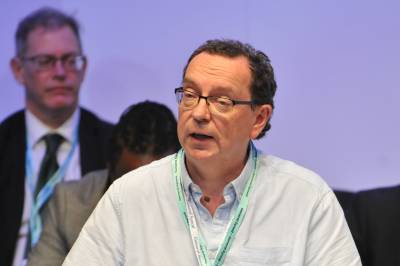22/03/2024
As we progress through Lent and into Holy Week a survivor of Church-related abuse parallels the Biblical betrayal of Jesus with the fight for just redress within the Church. The anonymous author is a member of the Redress Survivor Working Group which is contributing to the design of the Scheme.
Reporting abuse and finding support
Readers may find some of the content upsetting. If you need access to support, please contact the Safe Spaces helpline by calling 0300 303 1056 or by visiting this Church of England webpage, where external support services are listed, including listening, advice, and counselling services.
By an anonymous member of the Redress Survivor Working Group
As we progress through Lent our eyes begin to turn towards the events of Holy Week. Given everything else that’s happening in the Bible story, it’s easy to skip over the trail of money which passes between the chief priests and Judas. In Matthew’s gospel we read that Judas went to the chief priests and asked them how much they would give him to betray Jesus, and in response they hand over 30 pieces of silver.
Once Jesus has been handed over to Pilate, Judas returns to the temple, and in his guilt and regret, attempts to return the money. The chief priests refuse, Judas throws the silver on the temple floor, and leaves. At this point we read that the chief priests gathered together and discussed what to do with the silver. Even though they have been party to the initial payment, they agree that they cannot accept the silver back as it would be unlawful to put blood money into the temple treasury. Even though they are behind this, the money is dirty, and they don’t want to be contaminated by it.
The machinations connected to compensation and insurance pay-outs can feel like dirty money. Survivors of church-related abuse, who have received compensation in the past, have common and often harrowing stories of how the Church of England, her insurers, and her lawyers, have refused or minimised any compensation payment. At each stage survivors have had to fight to receive even the smallest slice of justice, and many have given up asking. Some survivors have been paid meagre amounts in return for their silence, or in the hope that they will just shut up and go away. Sometimes abusers, rather than face disciplinary action, have been paid to go away, and paid more than their victims received.
The Redress Scheme is being set up with the aim of being significantly different, and the Redress Survivor Working Group have been working hard to ensure this happens.

"We are never told to amass wealth and to be generous only when we fear we will be forced to hand it over."
The whole Church may want redress...but does the whole Church want to pay for it?
For some survivors, the thought of receiving money, from the place of their abuse, can feel dirty and complicated. Because of this, some survivors have requested a Redress Scheme through which they can receive money from a general pot, rather than receiving money from the place in which the abuse took place. If the Church is serious about offering apology and redress, they should take this request seriously, and offer survivors a scheme which allows distance between the redress given and the places in which the abuse happened.
Even though the Church of England has in principle agreed to a generous Redress Scheme and £150m has already been committed to underpin it, turning these hopes and intentions into actual money has been complicated and to get it right takes time. The whole Church may want redress to happen, the whole Church may want redress to be just, even generous, but does the whole Church want to pay for it?
Back in the 3rd century, as the legend goes, Lawrence was the archdeacon of Rome, keeper of the Church treasury, and responsible for the distribution of alms to the poor. In 256 Emperor Valerian decreed all bishops, priests, and deacons be executed, and the Church’s money confiscated. Pope Sixtus was executed, and the Prefect of Rome demanded that Lawrence hand over the treasury. Lawrence requested three days to gather the money, explaining that as there was so much it would take a few days to sort. During these days, Lawrence distributed as much of the Church’s wealth and property as he could to those who were in need. He then returned to the Prefect, with a delegation of those who were disabled, suffering, and homeless, and when the money was demanded he declared:
"Here are the treasures of the Church.
You see, the Church is truly rich, far richer than your emperor!”
Suffice to say, it didn’t end well for Lawrence.
The story reads a bit like a parable:
The kingdom of God is like this; a wealthy and powerful emperor tries to confiscate the Church’s wealth, but instead the treasury is poured out on those in need.
The kingdom of God is like this; a group of outcasts, paid and recognised as the treasure of the Church.
Whilst the story reads a bit like a parable, there is absolutely no suggestion that the Church might have given her riches, in such abundance and generosity, if the treasury wasn’t about to be confiscated. But in Jesus’ teaching about wealth, we are never told to amass wealth, and to be generous only when we fear we will be forced to hand it over.
Redress is not about giving alms, but paying back debt owed, for sins perpetrated
Of course, our situation is also different to Lawrence’s, as the damage and needs survivors experience are directly linked to the actions of the Church. Redress is not about giving alms, but paying back debt owed, for sins perpetrated. It is impossible to imagine a parable scenario in which Jesus might advise the believers to withhold financial support from victims and survivors until they are legally forced to do so.
The Church of England is in a position to make choices about her money. Her commissioners, her lawyers, her insurers, and her bishops, can choose what money is invested where, and what redress payments are made. But so can her members, her parishes, and her priests. The Church’s wealth is not about to be confiscated, and yes, this may feel like dirty money, because in part it is. It is also money which can be withheld, or money which can be freely given, money which can be used to start to make amends for the sins committed.


